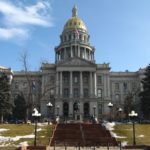From the Denver Business Journal
Colorado law has emerged as a surprise obstacle to state regulators hiring administrative law judges to help make decisions about permits for drilling new oil and gas wells.
The Colorado Oil and Gas Conservation Commission is rewriting policies to match sweeping oil and gas regulation reforms passed in April by the state legislature.
Senate Bill 181 included a provision allowing the COGCC to hire administrative law judges, or ALJs, and have them review some permit applications, resolve mineral rights disputes and similar matters.
Using ALJs would allow the COGCC staff to tackle a backlog of more than 6,300 well-drilling permit applications built up at the agency. It also would, according to Jeff Robbins, COGCC executive director, free the COGCC’s nine-member commission to undertake regulatory rulemakings required by SB-181 about allowing more local-government say in well locations, addressing the cumulative health and environmental impacts of drilling, and increasing public transparency about the location of oil and gas well infrastructure.
But the COGCC says it can’t hire ALJs because Colorado’s administrative procedures law doesn’t authorize the COGCC to employ them.
The COGCC likely will ask the state legislature to amend the administrative procedures act and allow the COGCC to hire ALJs, but the legislature is not in session to amend state law until January.
“Essentially, the COGCC is on hold with it until that happens,” said COGCC spokesman Travis Duncan.
The COGCC pressed ahead this week with two days of public hearings about its proposed procedural changes for permitting decisions.
The agency proposed empowering hearing officers the COGCC already has on staff — all of whom are lawyers — to make binding permitting decisions just like future ALJs would.
Such staff-level decisions would be final if they weren’t appealed within 20 days to the full COGCC commission for reconsideration.
The changes were expected be the easiest part of adapting to SB-181, but the obstacle in state law and an unexpected amount of public reaction to the proposed changes are making it anything but simple.
Hearings held Monday and Tuesday drew hours of public comment.
Lawyers representing oil and gas companies expressed unease about the COGCC creating rules that treat COGCC hearing officers the same at administrative law judges, which under state law must be attorneys with at least five years of law practice.
The COGCC commissioners ended the hearings without deciding on the rule-change proposal, postponing a vote until its July hearings at the earliest.
Opponents of drilling testified that the COGCC should take up the high-profile public health and climate-protecting rule changes mandated by SB-181 first, not write new rules allowing the COGCC’s professional staff to approve drilling permits.
Some anti-fracking activists labeled the plan a fast-tracking of permitting that contradicts SB-181.
Many argued the COGCC should stop issuing new drilling permits until other rule changes required by SB-181 are complete.
Not establishing a permit moratorium would be “reckless, dangerous and, we believe, illegal,” argued Dan Leftwich, a lawyer who testified on behalf of anti-fracking group Colorado Rising, concerned neighborhood residents in Adams County and other groups.
“Permitting cannot go forward until this commission can demonstrate — based on science and for the record — that it is protecting health, safety and the environment, as the law requires,” he said.
Some supporters of oil and gas urged the COGCC to assign at least one ALJ or hearing officer to work from a location in western Colorado, possibly added to a COGCC office in Rifle.
There are large natural gas fields in northwest and southwest Colorado. Technical drilling concerns and land-use questions in those areas — where wells often are on federal lands — are different from the permitting of wells in oil fields on private land in the Denver-Julesburg Basin north and east of Denver.







